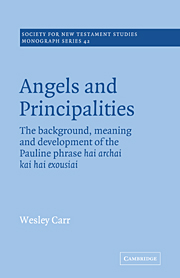 Angels and Principalities
Angels and Principalities The aim of this section of NT exegesis has been to investigate the use of the language of the powers as it occurs in the Pauline literature. Because the interpretation of these powers that is here offered runs counter to much that has been written and assumed about them, the attempt has been made also to show in each case that the fundamental understanding by Paul of αἱ ἀρχαἱ καἱ αἱ ἐξονσἰαι in bonam partem is consistent with a realistic understanding of the particular errors and teaching in each letter. At this point we may enumerate the conclusions.
The use by Paul of the language of the powers and associated terms conforms to basic Jewish usage. The understanding of the spiritual world generally at this time produced multiplication of spiritual beings in relation to God, while evil was limited to one being, the Devil, together with some demons. The terms used for the powers, however, are not applied to the demons, and what language there is of demons in Paul is very scarce and conforms to the traditional Jewish association of them with idols. These terms from Paul's Jewish background would also have conveyed to Gentiles notions of power and authority that are associated not with hostile forces but with God. For in general the pagan use of these terms is for the authority and power of rulers in the secular world. The exact historical situation of Paul needs to be appreciated before any attempt is made to understand the meaning of his teaching on this subject.
To save this book to your Kindle, first ensure no-reply@cambridge.org is added to your Approved Personal Document E-mail List under your Personal Document Settings on the Manage Your Content and Devices page of your Amazon account. Then enter the ‘name’ part of your Kindle email address below. Find out more about saving to your Kindle.
Note you can select to save to either the @free.kindle.com or @kindle.com variations. ‘@free.kindle.com’ emails are free but can only be saved to your device when it is connected to wi-fi. ‘@kindle.com’ emails can be delivered even when you are not connected to wi-fi, but note that service fees apply.
Find out more about the Kindle Personal Document Service.
To save content items to your account, please confirm that you agree to abide by our usage policies. If this is the first time you use this feature, you will be asked to authorise Cambridge Core to connect with your account. Find out more about saving content to Dropbox.
To save content items to your account, please confirm that you agree to abide by our usage policies. If this is the first time you use this feature, you will be asked to authorise Cambridge Core to connect with your account. Find out more about saving content to Google Drive.